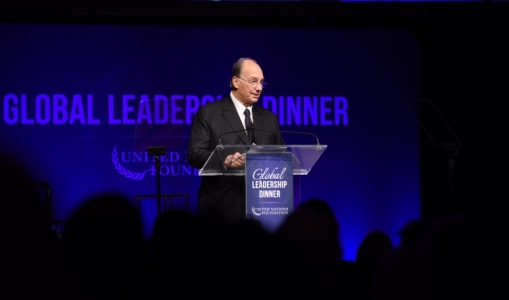Speech by His Highness the Aga Khan at the United Nations Foundation Award
Bismillah-ir-Rahaman-ir-Rahim
President of the General Assembly Miroslav Lajcák,
Secretary-General António Guterres,
Deputy Secretary-General Amina Mohammed,
Former Secretary-General Kofi Annan,
The many Permanent Representatives in attendance,
Ladies and Gentlemen
Thank you so much Kofi Annan for your generous words of introduction. There is no person alive today who has made a greater contribution to world peace than you, and thanks are due to you from all around the world.
It is a pleasure for me to share this beautiful evening with all of you, and what a special honor it is to be receiving from the United Nations Foundation its “Champion of Change Award.” I must also say that it is a very humbling experience - especially as I look around this room at so many people who have truly been outstanding “Champions of Change” in so many fields of endeavour - including the others being honored tonight. I am indeed humbled to be in their presence.
I have come to know about the United Nations Foundation through our admired friend, Kofi Annan, who has been one of our “educators-in-chief” in spreading the good word about the UN Foundation - of which he is an extremely devoted and effective board member.
I am also an enthusiastic supporter of the UN Foundation for another reason. What has caught my attention for many years is how closely its philosophy about global development actually parallels our own. The words that leap out of its mission statements include terms like “linking” and “connecting…” not only with the United Nations itself, but with a host of other organisations. Some of these are private, some are governmental, and some are private but not-for-profit. I refer to this third category of institutions as “Civil Society” - by which I mean essentially private organizations that are fundamentally devoted to public purposes.
For a long time, political debate all around the world focused on the competing merits of government action versus private enterprise. My conviction, which has deepened through the years, is that these are false alternatives - and that is the central message I would emphasize in these brief remarks tonight. The question is not which sector can be most effective in the march towards progress - the central question is how these sectors can best become effective partners in this quest.
The concept of public-private partnerships has been one of the keys to the best work of our agencies, in many fields and many countries around the world in the last sixty years since I became the Imam of the Ismaili Muslim community. The public-private partnership formula alone, however, is incomplete - unless we also insert the words “Civil Society.” The partnerships that will most dramatically change the world are those in which all three components - private, public and civil society institutions can connect - one with the other - in all-embracing common effort.
When that happens, other concepts emphasised by the UN Foundation also come alive. I have been impressed, for example, by the innovative terminology the Foundation uses in expressing its goals: like these three dynamic words: “Catalyzing” – “multiplier” – and “effects.” Think about it.
The notion of “catalyzing multiplier effects” reflects a similar dynamic to what I refer to as “trampoline” projects for development. These projects are best-practice examples of balanced partnerships between governments, private entities and civil society, threaded together by innovative thinking, intelligent structures, and clear lines of communication. Well-defined goals and responsibilities are essential, as is the buy-in of the target constituency.
Such projects offer the potential for long-range impacts, which go well beyond immediate, short-term results.
This goal is - to be candid - sometimes easier to talk about than to accomplish. But one of the great global models of how best to pursue this aim has been the United Nations Foundation.
Another central part of our Aga Khan Development Network’s approach is one that we also share with the United Nations Foundation: an emphasis on what we call “countries of opportunity”. The issue is to do what we must to set them alive by creating and sustaining an enabling environment.
And fundamental to all of this, of course, is a basic philosophical commitment which is expressed by another important word and that word is “pluralism”. This is a frame of mind which regards diversity, multiplicity, and indeed difference itself - not as a burden nor a threat but as a gift - a Gift of the divine - an opportunity to learn rather than a danger to be avoided.
So - it is with all of these thoughts in mind that I say again how proud I am to be here to accept your award - recognising how it reinforces not only the important “words” but also the useful concepts, and indeed the central “values”- that we - all of us - hold in common.
Thank you very much.
- 8951 reads
 Ismaili.NET - Heritage F.I.E.L.D.
Ismaili.NET - Heritage F.I.E.L.D.